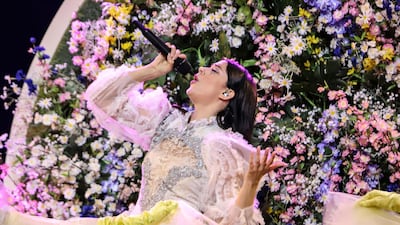Move over Maria Callas, there's a new raven-haired songstress ready to take the mantle as a symbol of Greece's musical talent. "The Greek music scene is in need of new music, new voices, new songwriters, new sounds," says Katerine Duska, who will represent the country at this year's Eurovision Song Contest (2019 will be the competition's 64th year). She certainly brings something new to the scene and her music could well be described as a mix of Marina and the Diamonds (another Greek export) and France's Christine and the Queens, only a tad more raw.
Combining an uplifting pop melody with Duska's soulful, bluesy voice and ability to hit heartbeat-raising high notes, her Eurovision single Better Love is set to rake in the 12-point votes this year. The video for the song, a kaleidoscope of pink and red with creative direction from Greek photographer Efi Gousi, is a stunning two minutes and 58 seconds of conceptual bricolage.
It's packed with offbeat characters wielding fencing swords, slowly eating grapes and balancing pink balloons, all while Duska, resplendent in layers of baby pink tulle and her signature red lipstick, punctuates every word. Not surprisingly, it's received one of the highest number of views online among the Eurovision entry videos.
It also stands out as an unconventional choice for Greece, a nation usually represented in the competition by its folk styles of dance and traditional bouzouki-inflected pop music. "My music doesn't have that folklore element that makes it 'pop' in Greece," says Duska. "That's what most Greeks listen to, so I've been categorised as 'alternative', which is quite funny because my music is pop."
Early life
Having grown up in Montreal, Canada, she brings an international awareness to her music that previous Greek entries did not. Singing in English as opposed to Greek, her lyrics are about the "quest for a deeper, purer level of love". Duska credits her upbringing in Canada for the inclusive feel of her music. "I feel blessed to have been raised in Canada, to have gone to the school I went to," she says. "The teachers at school there focus on shaping you as a person and it's not simply about being a good student, but about comprehending the world and comprehending our differences."
But Duska was a good student, so good that she trained as a lawyer initially, dropping out of law school at the age of 23 to pursue her music career full time. "I'm a bit of a late bloomer when it comes to my music," she says. "It took me a while to find myself because I got lost in what people wanted and expected of me. It kind of was the symptom of being in a Greek family and of being in Greece."
Duska worked three jobs to pay for music lessons and eventually recorded a demo called One in a Million, in which her voice is comparable to that of Amy Winehouse, that has so far amassed more than 630,000 views on YouTube. The song was also broadcast by radio stations across Greece. Since its release in 2013 and her first performance as a solo artist that year, it appears that Duska is exactly what the Greek music scene has been waiting for.
"It was crazy when I started hearing that first demo on the radio," she says. "People really liked it here in Greece and it was shared on Facebook, which is crazy because I had about 200 friends on Facebook and I'm really not very socially connected. To have all these hundreds of shares in only a few days was unbelievable."
A new voice for a generation
Duska is now the face of a generation of Greeks rising from the ashes of their country's economic crisis. Many young Greeks, about 40 per cent of whom are unemployed, are pouring their time and energy into creative pursuits that are enriching the nation in a completely new way. "I feel like I'm representative of a new Greece, with different stimuli and a new voice," she says. "It makes me so proud, being a part of this new wave of blazing artistic spirit in Athens."
Also at the vanguard of Greek creativity are Gousi and Greek film director Yiorgos Lanthimos, whose film The Favourite was nominated for an Oscar for Best Picture this year.
By working internationally, the pair are helping to showcase modern Greece as a place where new ideas can and are taking shape. This new generation of talent is not leaving it to Greece's classical history to represent their nation across the globe. Instead, they are powering forward with their own identity.
Duska says Greece's capital city is at the heart of this cultural evolution. "People have a strong creative drive here and they're saying things like, 'Athens is the new Berlin,'" says Duska.
During the week, young people spill out of restaurants into the tree-lined pedestrianised streets of Athens, with unemployment meaning there's little difference between a weekend and a weekday. "We have so many issues, such as unemployment, and people are having a very hard time simply making ends meet, but somehow they find a way to overcome it," says Duska. "In Greece, it's not all about money, careers and cars. We're not a consumerist kind of country."
Duska says that what characterises Greeks is "our sheer ability to take pleasure in and live out the moment". You can only imagine how that moment will feel to the Greeks should Duska win Eurovision.
The Eurovision Song Contest begins on May 14, with the final held on May 18

